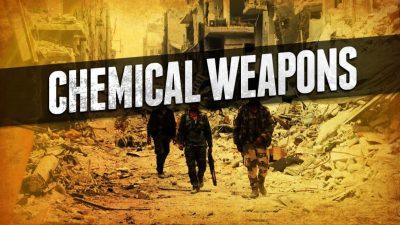Video: Several European Countries Deliver Chemical Weapons Components to Idlib? Russian Report

Components of chemical weapons were delivered to the Syrian province of Idlib from several European states, Director of the Department for Arms Non-Proliferation and Control at the Russian Foreign Ministry Vladimir Yermakov stated on September 25. On September 20, Russian Foreign Minisry spokesperson Maria Zakharova stated that a threat of staged chemical attack in the province of Idlib still remains. The diplomat stated that Hayat Tahrir al-Sham (formerly Jabhat al-Nusra, the Syrian branch of al-Qaeda) was supplying its allied militant groups with chemical agents with this purpose.
These statements by the Russian side show that the situation in Idlib still remains complicated and chances of a new escalation are high if militants attempt to sabotage the demilitarization agreement reached earlier this month.
Meanwhile, the Russian-language media speculates that Russia will provide Syria with a batch of short-to-medium range air defense systems additionally to the already announced supply of S-300. These reports remain unconfirmed.
Jordan and Syria may open the Nasib border crossing in the first half of October, according to the Jordanian newspaper al-Ghad. On September 25, Syrian Prime Minister Imad Khamis announced that the Syrian side of the crossing had been restored.
If true, this development will mark another stage in the restoration of southern Syria after its liberation by government forces earlier this year. This will also allow more Syrian refugees to return to their homes from Jordan.
US Defense Secretary Jim Mattis has ordered the military to pull out four Patriot air defense systems from from Jordan, Kuwait and Bahrain in the Middle East, the Wall Street Journal reported on September 26, citing several senior military officials.
According to speculations sparked by this report, the decision is aimed at boosting the US effort to counter more global “threats” such as China and Russia as Washington shifts its global strategy. Nonetheless, a conflict with Iran and support to Israel are important points of the foreign policy of the current US administration. US President Donald Trump has repeatedly stated this officially. Furthermore, his administration has made a number of steps in this direction. In light of the recent developments over Syria, including the IL-20 incident and a Russian decision to supply an S-300 system to the Syrian military, it is highly unlikely that the US will decrease its military, diplomatic and economic involvement in the Middle East issues anytime soon.
*
Note to readers: please click the share buttons above. Forward this article to your email lists. Crosspost on your blog site, internet forums. etc.

